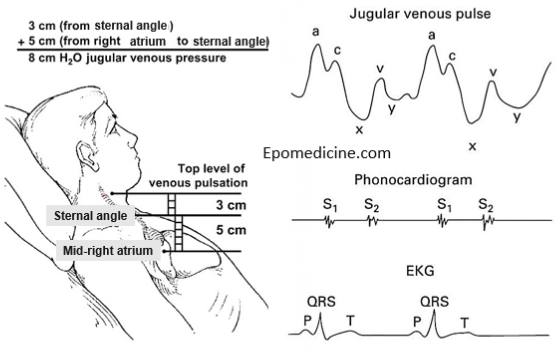Synonyms: Morbus coeruleus, Blue disease Definition of Cyanosis Cyanosis is the bluish discoloration of the skin, mucous membrane and nail bed usually owing to atleast 5 gm/dl of reduced hemoglobin/deoxyhemoglobin or abnormal hemoglobin derivatives (eg. methemoglobin, sulfhemoglobin, etc.) circulating within the superficial dermal capillaries and subpapillary venous plexus (not, as commonly taught, the…
X-ray of Mastoids
While we have more sophisticated radiological techniques of examination of the mastoids, the ability to read an X-ray of mastoid is a must for the undergraduate students of the medicine. While describing an X-ray in ENT or Otorhinolaryngology, you need to comment on these points: Plain or Contrast Regions: Mastoid,…
Basics of Fluid therapy
A. Anatomy and Physiology of Body Fluid Compartments: Remember the “60-40-20” rule of body water. 1. Total body water: 60% (50-70%) of Total Body Weight Greater in lean individuals because fat contains little water Greatest percentage in newborns, then decreases with age 2. Intracellular fluid (ICF): 40% of Total Body…
Myringotomy and Tube Insertion
Synonyms: Of Myringotomy: Tympanotomy (Opening the middle ear cavity), Tympanostomy (Instillation of a ventillation tube), Myringocentesis Of Ventilation Tube (VT): Grommet, Pressure Equalization Tube, Ear tubes, Tympanostomy tubes Definition of Myringotomy Myringotomy is the incision on the tympanic membrane to remove accumulated fluid or to provide aeration in case of…

Ignoring Consent and Counselling is a spark to all troubles
Information about his health is patient’s right excluding certain modifiable scenarios. This right is retained by the attendant of the patients as well. Most often the root of all trouble lies in the failed communication and inability of the doctor or medical personal to build a sense of transparency and…
Leprosy: Etiopathogenesis, Classification and Complications
Synonyms: Hansen’s disease, Kushta roga, Mezels Definition: Leprosy is a chronic granulomatous disease, caused by Mycobacterium leprae which affects prinicpally the skin and peripheral nerves. Other commonly affected sites are the cooler parts of the body like mucosa of upper respiratory tract, anterior chamber of eyes and testes. The cooler…

Jugular Venous Pulse and Pressure (JVP) Examination
Definition of Jugular venous Pulse and Pressure Jugular venous pulse is defined as the oscillating top of vertical column of blood in the right Internal Jugular Vein (IJV) that reflects the pressure changes in the right atrium in cardiac cycle. Jugular venous pressure (JVP) is the vertical height of oscillating…
Applied Anatomy of Palatine Tonsils
Synonyms: Tonsils (Unless otherwise specified, tonsils usually refers to palatine tonsils), Faucial tonsils Definition: Almond shaped, ovoid mass of lymphoid tissue situated bilaterally in the lateral wall of oropharynx within the tonsilar recess or sinus bounded by palatoglossal fold anteriorly i.e. anterior pillar and palatopharyngeal fold posteriorly i.e. posterior pillar….
